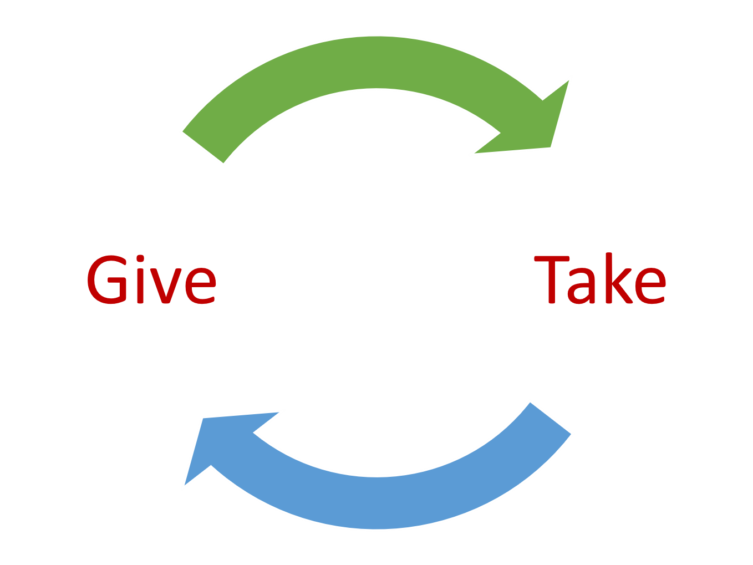The Give and Take of Teams
We received an email this week letting us know our patio installers will be arriving two weeks earlier than expected (what patio company arrives earlier than expected?! A really good one…). Slight panic ensued as we rearranged weekend plans to ensure we’d have the demolition of our deck done in time for the patio installers. It also reminded me why we need the process of give and take on our teams.
If you’re like me, you like to be independent and to do things yourself. You dislike asking others for favors and help. You may also like to help other people but you don’t like to ask others for help. Then there are times when you realize no matter what you do, the task before you can’t be done alone and you have to ask even if you’d rather not.
This is one of those times for us. We had to put out an SOS text to our friends asking if they can come in and help us with demolition. It felt weird because we are usually the ones to give help, not take help.
The Law of Reciprocity
In their book, Influencing without Authority, authors Cohen and Bradford, identify the law of reciprocity. The law of reciprocity basically says, “There’s a baseline expectation that when we give, we will be reimbursed for what we’ve given.” Our work is a prime example. I give of my time, effort and expertise, in exchange, you pay me for what I’ve shared with you.
In our personal lives, many of us people who are givers and those who are takers. Most of us would rather be givers over takers. However, this creates an imbalance in the law of reciprocity. If we are by nature givers only, then people don’t feel they can pay us back, which is a key element to our basic principle of reciprocity.
We need to be both a giver and taker to balance the equation. The same is true on our teams.
Reciprocity on Our Teams
What does this balance look like on our teams? It looks like everyone contributing and taking equally. When our team’s reciprocity principle is out of balance, we see grumbling, backstabbing, and workarounds.
When the team’s reciprocity principle is in balance, we see openness, idea sharing, and trust.
We are givers when we: share information, solve someone’s problem, serve the customer, and act with empathy. All of those are great things. And yet…
Balancing the Equation
Remember – we don’t like people who only take or who only give. It’s great to be a giver on your team, but we have to balance the equation or others will stop giving because they lack the opportunity to pay back their perceived debt.
When You Take
Some things to keep in mind as you balance the give and take equation:
- Be mindful of others need to give, even if that means you become the taker. People would rather give than take, so by occasionally stepping into the role of taker, you allow others to do what they love – give!
- Don’t be afraid to ask for help. People are grateful to have the chance to serve those in their lives who have given freely to them.
- Recognize your turn will come. Everyone gets a turn to take, usually because of something unexpected. When your turn comes to receive, it’ll be with the knowledge that you would give if you were in that person’s spot.
We need our teams because we all have moments of give and take. Our relationships provide balance to the equation.
This week look for places you can give to your team – and more importantly where you allow someone to give to you.
For those allowing us to take this week, thank you for your help! We could never be ready in time if it weren’t for you!
Keynote speaker, trainer, and consultant, Sarah Gibson, helps organizations leverage the power of communication, teamwork, and diversity to improve engagement and transform teams. To buy her book or inquire about her speaking programs, please visit www.sarahjgibson.com.



